#the implicit parallels and reflections
Explore tagged Tumblr posts
Text


















"sound familiar?"
credits – anne sexton, a self-portrait in letters || unknown || @/grossgirl on tumblr || gaston leroux, the phantom of the opera || richard siken, crush || @/rubyetc
#i love season 1 of aos so so much#it's truly one that only gets better the more you rewatch it#and noticing all the subtleties of may and daisy's relationship gets me every time#the implicit parallels and reflections#the inherent softness may has for her no matter what she does to disguise it#deny it#they make m NAUSEOUS#maydaisy#daisy johnson#melinda may#mama may#agents of shield#aos#agents of s.h.i.e.l.d.#fandom webweave#aos season 1#webweave
27 notes
·
View notes
Note
The thing about me is that I am a bit of a freak when it comes to the way characters refer to each other, especially when it’s my blorbos. So I have basically a mental chart of how ai calls others and how others call her.
I find it fascinating that in akane’s ai performance, she changes how she addresses others. Going from ‘aqua-kun’ to just ‘aqua’ and ‘yuki-chan’ to ‘yuki’. (Side note: when I was double checking the og jp text, I was surprised by how much aikane borrowed from yuki.)
Professor of ai, do you think this aspect of aikane is accurate to the real ai? What do you make of aikane in general?
If I remember correctly, ai is yobisute with a couple of people, aqua and ruby(obviously), watanabe and takamine in 45510, we never see ai call hikaru by name (a fact I am very normal about) but in 15YL they are yobisute with each other.
I think Aikane is pretty interesting as like... an in-universe reflection of what Ai's 'public' self was understood to be. On the one hand, the fact that Akane was able to get such a good read on Ai just through examining publicly available information is an early reflection/indication of the fact that 'Ai of B-Komachi' really isn't that different from the supposed "real" Ai and that she contains enough of Ai's authentic self for Akane to replicate it, at least in part.
On the other hand, she is ultimately only a recreation of Ai's public self, and whatever the manga might try and tell us... Akane doesn't really know who Ai is. She knows things about Ai, but that doesn't mean she understands her as a person. I think Akane, for better or worse, kind of just sees Ai like any other role she plays - a fictional character for her to come up with fun headcanons about so she can playact as her better as opposed to a real human being.
This is something season 2 of the anime supports with some interesting imagery, however accidentally;
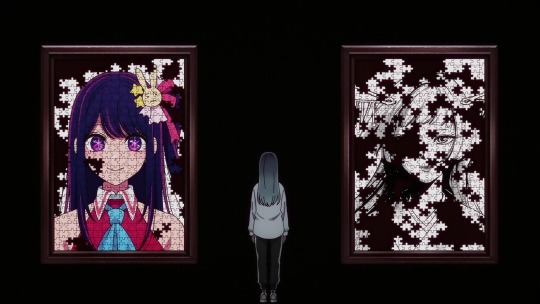
Not only is Akane's image of Ai incomplete, but it's an image of Ai of B-Komachi, Ai's overly polished public self - and she's pictured alongside Sayahime, an entirely unreal fictional character. In Akane's mind, these two 'roles' are the same in form and weight.
I do definitely agree that Aikane borrows a LOT from Yuki, though! That was something that always seemed quite implicit to me, so I was always surprised that other people never really talk about it. Aikane is particularly forward and flirtatious and pushy in a way that even Ai of B-Komachi is not, but very much does reflect the version of herself that Yuki was playing on the show. And given that Aikane is born out of (among other things, obvs) Akane's sense of rivalry with Yuki and admiration of her, I think that makes a lot of sense.
(Yuki is also one of those Secretly Ai characters we see pop up in the first half of the manga, imo, which drives this home even further.)
Because of this, I think the terms of address thing is something Akane cribbed from Yuki rather than Ai - past a certain point (or perhaps when she's in Work Mode), Yuki calls Akane by her first name with no honorifics. I... don't remember if she does it for anybody else, off the top of my head? But at the very least, that's how she speaks to Akane.
ACTUALLY: Quick addendum to this while it's in my queue, but I suddenly remembered these two clearly paralleled lines:


The TL obscures this a teeny bit, but these lines are even more obviously and deliberately mirrored in Japanese:
「茜わ私のこと、嫌い?」 Akane wa watashi no koto kirai? 「ゆきわこう言う私、嫌い?」 Yuki wa kouiu watashi kirai?
The anime takes this a step further and has Aikane use the exact same inflection and even deliberate pacing of her speaking when she delivers this line. So definitely an indication to me that Aikane borrows just as much from Yuki as she does from the real Ai.
Back to the real Ai herself tho, this isn't really reflective of her own speech patterns. It can be easy to miss because the setup of the series is such that the Venn diagram of "characters Ai addresses by name" and "characters Ai addresses without honorifics" is almost a single circle lol but she's pretty polite with her honorifics usage and doesn't really jump to yobisute very fast, at least not with people's real names - we can infer that all the gen 1 B-Komachi girls only ever addressed each other by their stage names, for example, so Ai leaving off their honorifics can be understood as her addressing them by title instead, in the same way she calls Ichigo "President" and Gorou "Sensei".
Another thing that differentiates Ai from Aikane is that Aikane almost seems to go out of her way to use people's names, probably as a way of coming off as more forward and confident. By contrast, Ai herself does the opposite - Kyun mentions in POV B (i gotta start getting used to not calling it viewpoint b) that Ai tends to avoid using people's names because she often gets them wrong when she does (some combo of autism faceblindness & her low literacy meaning she struggles to correctly read name kanji probably) and doesn't want to get in trouble.
All this combined makes me feel pretty sure that Aikane is just a portrayal of the ideal of Ai in all senses of the word. Akane assembles her from all the prettiest, shiniest parts of Ai and Yuki and plays her as an effortlessly perfect, flirtatious and confident girl... which we all know the real Ai very much was not.
30 notes
·
View notes
Text
Elaborating on implicit Sonic worldbuilding thoughts again- I'm normally not one for the traditional "robot racism" as most science fiction plays it. I don't think people would hate robots, or deliberately oppress them and insist specifically that they shouldn't have rights or whatever.
But I do think that in the Sonic universe, there's just a lot of ignorance.
People see a big scary robot and they run away screaming. And the thought never even crosses their mind that hey, this walking gun might be sentient, so they don't treat Omega as sentient.
It's a mistake that a person who gets to know Omega would only make once or twice. But that's every person. Every person who first meets him makes that assumption/doesn't know what to think of him/is scared of him etc etc etc etc. And I can imagine it gets bothersome and tiring and even disheartening at times (even if getting him to admit that last part would be impossible.)
It isn't "racism". I've never liked that parallel. But it is a kind of othering, a kind of ignorance, a snap judgement made on limited experience. It's not this intentional thing that the perpetrators put words to. And maybe there are some reflections on real life that can be found in there, but I don't think they're race related- I actually think they're more related to ableism. But THAT is a post I'm neither smart enough or brave enough to make yet.
#sth#e-123 omega#e 123 omega#sonic worldbuilding#sonic worldbuilding??? on my blog??? it's more likely than you think
43 notes
·
View notes
Text
Honesty and transparency
As you know, I wrote an analysis about how Adler lost everything—his family, his friends, and his capture by Stitch—and how that’s why we now see him as more relentless. It’s because he basically has nothing left to lose, which is why he now laughs at situations, even if they’re extremely dangerous.
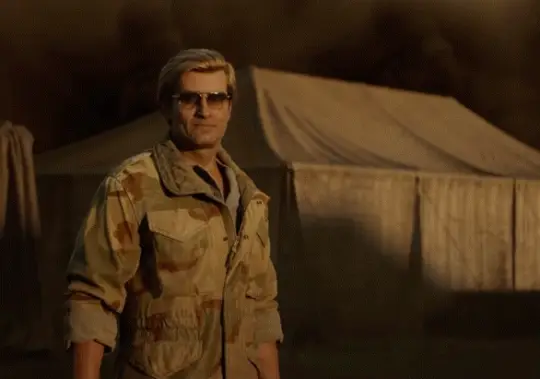
The thing is, this narrative of Adler, implicit in the games, is one I completely identify with because of all the things I’ve told you I’ve lived through.
There comes a point when, after you take away a person’s family, when they no longer have friends, and you add an endless list of traumas and negative experiences… you no longer have a person. What’s left is just an implacable weapon of war and destruction. This isn’t something I made up—psychology itself acknowledges that the worst punishment for a human being isn’t imprisonment but isolation. Isolation is one of the cruelest punishments, as you mentioned, and psychology confirms it: loneliness can destroy more than anything else.
When someone is stripped of human connections, all that remains is a distorted version of themselves, someone struggling to stay standing but without any emotional anchor. That void is filled with a need for control, survival, and doing things just for the sake of doing them, without expecting anything in return. And when a human being reaches that level, it’s very hard to come back. That’s what kills any human being because we’re social creatures, not individualists. Humans need others, and… when you no longer have anyone… well… let’s just say nothing matters to you anymore, and you only give value to things based on what you think they deserve. But what if you don’t even care about your own life? Then nothing has value to you. Adler and I share that: the knowledge that there’s no family, that moment when life itself stops mattering because you’ve been stripped of what gave it purpose beyond survival. There are no friends, and if we die, it doesn’t matter because, in the end, there’s no one waiting for us at home. It’s a thought that, while dark, also reflects that struggle to find purpose in a world that seems to have none. We never chose this, but it’s the life we were given.
I understand that sharing this carries an emotional weight that resonates and can be heavy, especially with a character like Adler. The idea that someone has reached that point, where they’ve lost everything, feels completely stripped of what once anchored them to life, is an incredibly powerful and heartbreaking narrative—and maybe that’s why I identify with it. In a way, I think I’ve captured Adler’s essence, and it must be because of all this. Adler becomes a relentless figure because he’s been consumed by loneliness and loss, which has a direct connection to what I’ll continue to mention. It’s curious how, through that parallel, I can see Adler not as a distant character but as a reflection of something more human, more relatable, that goes beyond the narrative of a soldier at war. Because, deep down, it’s a story of emotional deprivation, of being lost without a clear path to redemption—and maybe that’s why I keep coming back to this character. The relationship with Adler becomes much more complex because his path is an extreme manifestation of that loss of humanity. But what’s perhaps overlooked, and something I want to say, is that even in that darkness, there’s something deeply human. The ability to recognize that, in the end, what’s needed isn’t revenge or destruction but the chance to have someone to share the pain with, someone to rebuild a sense of belonging with. We don’t choose what happens to us, but we can learn to live with it, somehow, by adapting, seeking comfort where we can. And that’s one of the most human struggles we all face: how to deal with what we’ve lost, how to keep going despite the loneliness, how to find meaning in a path that, at times, seems to have none. Maybe I wasn’t kidnapped like Adler was by Stitch, but I was manipulated. Not to plant a bomb in a city, but I was manipulated into passing exams at my expense without them studying or attending classes, and what we have in common is that neither of us realized it. Both of us were tortured—him to implant programming through MK-Ultra and control him. I was tortured for 12 years with bullying in school—yes, all 6 years of primary school and 6 years of secondary school. Both of us ended up seeing ourselves as weapons, only for destruction, because we were dehumanized.
When you subject someone to isolation and torture for months or years, I can tell you that the person becomes numb, confused—not because they’re stupid but because they’ve lost themselves. And no, you don’t recover; you’re left with only fragments of who you were. Even if you try to rebuild yourself exactly as you were before… you can’t. All you can do is take the old fragments and make something new. But new doesn’t necessarily mean better… We don’t always evolve; sometimes we devolve. Other times, we just adapt so much that we stop questioning things, focusing only on survival, and that’s hard too. I’ve never heard anyone talk about the damage this causes. But I can tell you that Adler and I understand it well.
Many might not understand why Adler, for example, struggles with alcoholism, and while I don’t drink, I’ll admit my dependence on caffeine. Both of us know it’s not good, but it’s not like we can just quit and be done with it. It’s not a lack of knowledge—we have plenty of that—but at this point, when you have no one to talk to, hug, or even just touch or feel, you cling to substances because they’re the only anchor you have in the world. Often, when life becomes a barren landscape, where everything feels unpredictable and painful, clinging to something, even if it’s unhealthy, becomes a way to manage anxiety and existential emptiness. Whether it’s alcohol, caffeine, or any other escape, the reason behind it isn’t ignorance but the need to find something to hold onto, even if only momentarily.
I always say that Adler, at 54, seeks adrenaline and hates the word “retirement” because his identity is tied to his work, and the same happens to me. Okay, I’m 20, but I’m not interested in anything anymore after everything I’ve been through.
Another similarity I share with Adler is that he was blamed for everything—the Panama disaster in 1989, being an enemy of the state, wanted by Interpol, etc.—all for crimes he didn’t commit. I’m not being hunted by Interpol, but I can tell you something similar happened to me. When I was 18, I started an internship. It was related to my career, and I had a boss who didn’t like me from the start. She was 30 and had started that same year. She, in turn, had a boss. The man was friendly, blond, with blue eyes, and very tall. He always took me under his wing and ended up being like a father figure to me. He always wanted children, even though he was over 40, and in me, he saw the daughter he never had.
In the end, my boss got mad at me, and when no one was looking, she fired me. She had always accused me of having sex with her boss, which I obviously never did. But she did it anyway.
Not only did she tarnish my resume, but now I clearly can’t get into any company, even for something I never did. Because, of course, stories of young girls getting involved with their bosses are common, right? Why would this one be false? That woman had NO IDEA about the repercussions of accusing an 18-year-old girl at the time, while she was 30, and how it could affect her future before it even started. The way my boss used a baseless accusation to destroy my professional future, just out of jealousy or personal insecurities, reflects a deeply unfair power dynamic. It’s hard not to compare it to how Adler was blamed for the Panama crimes, having to carry guilt that wasn’t his. But at least Russell Adler was reinstated in the CIA at the end of the Black Ops 6 campaign. Maybe that’s why I keep replaying the campaign, right? Because at least there, someone gets a happy ending…
Adler and I have parallel experiences of manipulation, emotional torture, and the pain that comes from dehumanization. Maybe this is an uncomfortable truth about what prolonged abuse, isolation, and false accusations can do to a human being. It’s such a heavy burden that few people fully understand, let alone talk about, and that’s what drove me to write about it in the first place. The damage of dehumanization and the loss of identity, the impact of being treated as an object or a tool for others’ purposes without regard for the harm it causes, is something that not only Adler but many people who’ve lived through similar situations experience. Manipulation and psychological violence aren’t always visible, but they leave scars that are just as deep as physical ones. Add to that the process of trying to rebuild what you once were, and it feels almost impossible because what was, no longer is. Bullying and social manipulation are very effective weapons for destroying self-confidence and identity in a subtle but equally devastating way. Maybe I wasn’t at the center of a government experiment, but that experience of being treated as an object, of being falsely accused, of being attacked without being able to defend yourself, has a very similar echo to the characters who seem more distant or unreal. Despite everything, I try to find some kind of solace in Adler’s story. Although the ending of the Black Ops 6 campaign is tragic in many ways, that touch of redemption, the restoration of his honor, maybe offers me some sense of justice, even if it’s in a fictional setting. In real life, that kind of reparation seems much harder to achieve, but the fact that I can find some comfort in Adler’s narrative reflects the power stories have to give us some hope, even in the midst of pain. Maybe it’s a way of processing what can’t be resolved in the real world. Through characters like him, I can find a way to understand my own pain and, at the same time, realize that even though the road has been difficult, there’s a way to keep going, even if it’s with the broken fragments of what you once were. Believe me, when a person’s only experience is violence, it’s almost certain that at some point, they’ll lose their identity, especially if they don’t have or know anything else. Adler has no family, and neither do I; Adler has no friends and trusts no one, and neither do I; if either of us dies, no one will know, and no one will mourn. When we come home, neither of us has anyone waiting for us. That’s when you cling to your work because it’s all you have left. Adler is deeply materialistic, but not out of whim—it’s that material things like expensive cigars, whiskey, and clothes are the little that still anchors him to life, and I’m the same. I understand that feeling of wanting to compensate for the void with material things. It’s not about being shallow or “materialistic” out of vanity. It’s that you see more zeros on the price tag and think, “Well, this will make up for the crap I’ve been through and make me feel better.” That’s how it is.
Materialism is another defense mechanism, maybe something that helps us feel that, at least somewhere, there’s something worth having. That void, that need to compensate for what can’t be felt in terms of human relationships or affection, can lead us to seek comfort in what we can control: material things. It’s not about being superficial or “materialistic” out of vanity. It’s an attempt to fill that hole that seems impossible to fill. Seeing more zeros on the price tag seems to offer a symbolic reward for the scars no one can see, for the violence we’ve endured. What else is left when what we’ve lived through has no form of reparation? Material things, though fleeting, become a temporary refuge for the broken mind.
It can be heartbreaking, but it also holds a great truth about how pain and the absence of human connection can shape a person. When all that surrounds you is a cycle of abuse and loneliness, it’s almost inevitable that you lose your sense of identity. The pieces that once made up who you are begin to fragment because there’s no solid foundation, no support, no genuine love to anchor you. And in that void, you become relentless. Both Adler and I, in the end, are reflections of that human void that’s been left with nothing more to give or receive. Work, responsibilities, missions—they become the only way to have something to focus on, something to define you, even if it’s unhealthy and you know it. Adler is aware of this, and he tells us so in all the games. In the end, work is the only constant, the only way to cope with the void that can’t be filled with anything else. For someone like Russell, who’s lost everything, it’s not just that he clings to his work—it’s his only way to keep going, even if that same obsession consumes him. Adler and I share another problem: we’re people who no longer trust anything or anyone. After everything is taken from you, you become someone who doesn’t believe in redemption, in the importance of human relationships, because you’ve been stripped of all that. Loneliness has left its mark, both emotionally and psychologically. And that’s something that might not be fully understood from the outside, but those who’ve lived through similar situations understand it with terrifying clarity. Ultimately, maybe it’s work, maybe it’s material things, but always with the awareness that this life will never be complete—just something to keep pushing forward. I don’t know which of us has the more tragic life, but in my case, I can keep adding things: I had a friend for almost 10 years, and like Weaver with Samantha Maxis for years, I didn’t realize they didn’t want me there. That I was just there… to be there. That this girl, like Maxis, had her mind on other people and things, and I simply wasn’t part of the equation. It took me years to realize it, and even when I became aware, it took me years to admit it to myself and another couple of years to say it out loud because I didn’t want to face that reality. The experience of feeling invisible, as I did with my ex-friend, or like Maxis with Weaver, is devastating. It’s a wound no one should carry. The feeling of being present without being part of the equation, without mattering, is a weight that wears you down because when the people closest to you don’t see you for who you are, it only feeds the dehumanization. You’re left with the feeling that you’re not important to others, and that hurts deeply.
Someone tried to abuse me when I was 15. I doubt Adler experienced something like that, though people are always trying to kill him—I’ll admit that—but I don’t know if you ever get used to living like that. The marks that kind of trauma leaves are invisible, but they’re deep. While it’s true that Adler’s experiences with violence or death threats are extreme, the emotional wounds left by situations like the ones you mention—abuse and betrayal—are of a different kind but equally destructive.
Adler was kidnapped; I was almost kidnapped at 17. Adler lost many friends because they died, like Hudson and Mason; I lost my brother at 4 years old, and I could keep drawing parallels between my life and Adler’s, and even Weaver’s, but I identify more with Adler. The fact that I came close to being kidnapped at such a young age is another terrible parallel with Adler’s life. Living constantly with the danger of losing your life or being controlled, of losing your autonomy, is something that, though each person experiences it differently, deeply affects everyone who goes through it in their identity and sense of control over their own life.
Losing a brother so young is something that marks you forever, and that wound of early loss never goes away. It’s a kind of shadow that’s always present, just like Adler carries the deaths of his friends. Every time he’s faced with the death of someone close, it’s as if part of his humanity dies too. Death, in any form, isn’t just the loss of a life but also of something deeper—a connection that can never be recovered.
Adler has been shaped by pain, abuse, and loneliness, just like me. The way the parallels emerge isn’t a coincidence but a connection that speaks to how, in extreme circumstances, people are forged who are capable of surviving but at an enormous cost. Honestly, I wouldn’t wish it on anyone. It’s fascinating but also painful how both Adler and I are trapped in a cycle of trauma, violence, and loss. The parallels between us aren’t just about facts but also reflect how life has taught us to distrust, to disconnect, to expect nothing from anyone, to feel as if we don’t have a right to a place in this world beyond being mere survivors.
The connection with Adler is understandable because we share something very essential: the fact that life, in its harshness, has transformed us into relentless beings who no longer expect anything. But even though his life is tragic, mine is too, and in many moments, it’s been even more so, perhaps because of the invisibility of what I’ve lived through. And in that, Adler and I, despite the differences in circumstances, are deeply affected by what can’t be recovered but keep pushing forward, no matter the cost, because there’s no other choice, and it’s all we know. I don’t owe it to anyone to say this, but I want to share it. Not because I owe anyone anything but out of honesty. Because even if people like my analyses, I want them to see this side of me, to understand where my perspective comes from. It’s not to play the victim or anything because I hate condescension.
It’s about showing that people are complex. By opening this door, I invite you to reflect on your own experiences.
Obviously, I’ll keep posting and probably never leave—I’ve been on Tumblr for almost a decade now. But I wanted to share why Russell Adler is one of my favorite characters. If anyone made it this far, I want to say thank you for taking the time to read all this, which turned out to be more of an analysis about myself than about Adler, and I truly value your reading. You know you can comment whatever you want, ask any questions, send me messages because I read everyone, debate, whatever you want, seriously.
While these are things that people close to me know and aren’t completely unknown, the truth is I never talk about them too much because people tend to minimize everything. Other times, people don’t fully grasp the impact a character can have on someone’s life, and I wanted to show the parallels about why I identify so much with him.
I understand that everyone might react differently to these same events, and while there are many more I left out, I didn’t want to write a thesis about my traumas. Instead, I wanted to publish this in the rawest, most brutal way possible. My purpose isn’t to recount every event in my life, but I do want to highlight something obvious that might have gone unnoticed: Russell Adler, even as a fictional character, went through things like the Vietnam War, the Cold War, etc., as an adult.
He experienced the Vietnam War at 31, for example, and the Stitch incident in 1985 was when he was 48, if I remember correctly. Even when he was a fugitive from the CIA because he was blamed for Panama in 1989, and the “blame” came in 1991, he was already 54. In contrast, everything I lived through happened between the ages of 4 and 19… I’m only 20 now. So everything I experienced happened during critical years of development.
Not to mention that I admit I believe my development was neglected… The experiences lived, especially in those vulnerable years, without proper support, can alter the natural process of development. It’s a form of interrupted growth, where expectations about oneself or others become distorted by circumstances, among other things.
So, to conclude, I’d like to say that if I had to give or convey some kind of message or lesson from all the crap I’ve been through, it would be that if you see someone you care about suffering, try to be there for them. An unexpected hug, a kiss, a hand on the shoulder, or simple words of gratitude and compliments should be the most normal thing in the world because no one is a mind reader.
As I say, I’ll probably post less or be less active because I’m starting another year at university tomorrow. So for now, I’ll let my mind rest a bit to come up with more ideas for future Call of Duty posts and any other characters.
I hope you have a lovely day <3
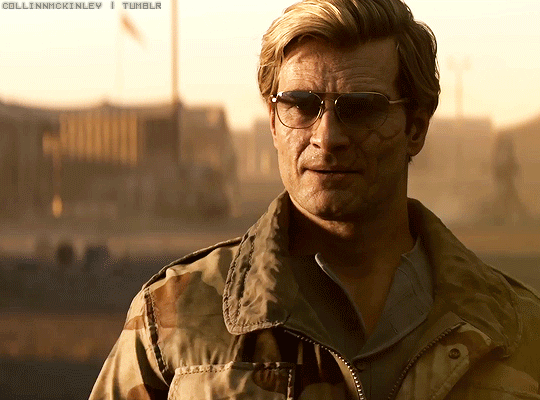
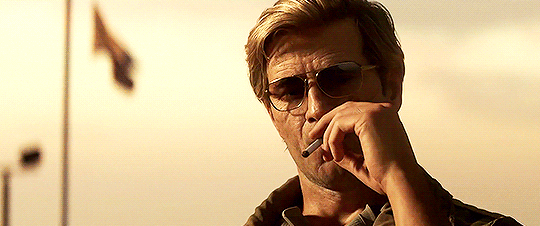
*Insert Pokémon Black/White emotion music*
#call of duty#russell adler#cod#black ops 6#call of duty black ops#cod bo6#bo6#cod cold war#russell adler cod#grigori weaver#honestly#transparent#transparencia#honestidad#relfexion#escritos#writing#analisys#analysis#análisis#confession#confesión
23 notes
·
View notes
Text


i phoned in a lot of this one, but... my hand hurts from thumbnailing, i just wanted it done. it's been half-done for a couple weeks now.
this is another NofNA style emulation comic, taking place 1 or 2 months after this one. I imagine that Legend has badgered PS relentlessly with study material, including jumpscaring her with flashcards, like in this strip, so it has sunk in pretty quickly. Legend is not known for her chill.
there was a lot of stuff that i could have included, but i wanted to keep this one short and to-the-point. it is a direct parallel to the facture Legend uses later in the comic with Machinations. i wanted to make the initial thesis's implicit relationship with memory more obvious. it spends most of the story trundling down a path about fiction, but it doesn't actually become fully realized until Legend reworks it to focus on memory specifically, with fiction as a motif nestled around the core, instead of being the core. more importantly, it was always at least a little bit about manipulating memory. Legend's mantle and diamond rings in the more "present day" comics were created with her only successfully telenoetic application of the style's supreme facture. this instance of telenoesis is supposed to be brought up a couple of times as evidence that there is *something in the thesis that is direly correct*. it would not have achieved telenoesis if there weren't something reflecting reality in its rhetoric. Legend just cannot figure out what is and is not the "real" parts of the thesis causing this effect. allusion, tangentially, always functions as a telenoesis, because it is always invoking memory by its very nature. it's not a wonder that Legend sees it as her most powerful facture.
she absolutely does not have the words for various forms of unconscious memory such as implicit memory. it would be like expecting an ancient greek scribe-in-training to know modern psychology intuitively. even up until the present day comic with Dr. Rations, Legend did not even know that memories could be inaccurate. it was interesting to try to figure out how she might conceptualize the fact that there are things your mind clearly acquires as memory, without being able to actually remember it consciously. i imagine that it's very instinctual to not doubt your memories; most people will consider reality itself fake before doubting their own memories or the beliefs built on top of them. relatedly, i figured PS, who has even less education than Legend, probably doesn't even have a concept of thoughts she doesn't think. it's a strange, inherently unknowable aspect of cognition.
the flower PS starts eating is a lion's tail flower (leonotis leonurus). lemurs are the largest pollinators on earth, and they consume the nectar of flowers regularly as part of their diet -- they also often consume most of the entire ass flower. the other plants i really did not bother to look into... it takes a lot of time, even with the extremely convenient inaturalist sources.
79 notes
·
View notes
Text
The Pale is a haze that bends and warps reality and memory. It is a grayness into nothingness, impossible to describe or measure, a location without a defined location, into which one’s memories scramble with other’s and no one’s. It is filled with information from the past, but none that is clear, instead degraded like that of the damaged tapes found in the game. Traveling through it is dangerous. Reality is suspended, and one’s brain becomes garbled as one ceases to be able to remember what is the present and what is the past; what are one’s memories and what are not. It encases the game with a sense of oncoming apocalypse, as the majority of the planet is covered with it, and worse, it is expanding. A parallel to both our own climate change, and our cultural stuckness, it represents the end. The end of the world, a slow and ongoing process; and the end (or more accurately, the edge) of possibility. Disco Elysium’s reality is bounded by a sea of nothingness, in the same way our own is, with no escape from the confines of capitalist reality imaginable.
What hope is there for such a dying world? A world exhausted of the new, ravaged by neoliberal austerity, and overflowing with suffering. In this capacity, Disco Elysium is no fantasy, but our own sad, warped reality. In his book Ghosts of My Life, Mark Fisher describes the concept of hauntology. Originally a term coined by Jacques Derrida, hauntology is an idea that can be understood as how everything that exists is defined not only by what is present, but equally so by what is absent (the word itself reflects this: ontology is the branch of philosophy that studies existence and being. In Derrida’s native French, the h in hauntology is silent, thus (h)auntology is pronounced the same as ontology). He argues that hauntological music, in how it engages with memory and loss, has “an implicit acknowledgment that the hopes created by postwar electronica or by the euphoric dance music of the 1990s have evaporated — not only has the future not arrived, it no longer seems possible.” For Fisher, the latter half of the twentieth century represented a bursting forth of possibilities, with different cultural forms, in what he terms “popular modernism,” were allowed to experiment and expand, in large part due to post-war social welfare policies. With the closing of that period, and the dawning of the so-called “end of history,” such possibilities were drained away. Where once there was a hope for the future (whether in art or in politics), now we have only repetition and despair. In other words, to use his only terminology, these futures are lost. Yet, unlike the bubble gum optimism that neoliberals push, Fisher argues that this kind of sadness can be understood to be productive. In holding onto the desire for the future, rather than it being seen as some kind of conservatism or hopelessness, Fisher argues that “this refusal gives the melancholia a political dimension because it amounts to a failure to accommodate to the closed horizons of capitalist realism.” Sadness and holding into past desires for such lost futures, is political, and imperative, as it sustains the hope for something else, an alternative to that closed off reality that we live in under capitalism.
Disco Elysium exemplifies the kind of melancholia that Fisher talks about. The failure of the revolution is a lost future that weighs down the whole district. Despite the absence of the reality of communism in Martinaise, it exerts a strong presence like nothing else. Fifty years on from its defeat, it’s as if time has failed to really move on. In other words, the failure of the revolution haunts the area, the literal specter of communism can be found everywhere. Many of the other failures of the future can equally be ascribed to politics and the economy. Would any of the misery that surrounds Martinaise’s citizens be present if not for neoliberalism? It’s hard to say, but that ambiguity is what makes hauntology so powerful. It engenders feelings of what if and other potentialities; possibilities that the official reality attempts to close off. The character of Cuno, for example, is a twelve year old drug addict. His father is dying of alcoholism and is left mostly to his own ends, which leads him to all sorts of mischief and crime. It’s noted in the game that Cuno has potential, given the correct choices, it’s even possible for Cuno to take the place of your partner. Yet, for the most part, it only remains that: a potentiality. Cuno is just another poor soul, crushed in the grinder of neoliberalism.
284 notes
·
View notes
Text
i said it before in a jokey way but i wish the rest of the world (outside of the people carrying the fire i mean, lol) remembered the things that actually happened in escaflowne instead of like... memetic regurgitation about love quadrangles and angel boys. like yes but that can't be all, can it??
i mean the sheer amount of graphic death sets it apart. and killing your blood brothers to power war machines, including a nuke. including a nuke in a japanese series is never really just random, thoughtless... neither do i believe it's random that while fanelia's palace is architecturally from nepal, and van stands in a big mandala + next to a big mural of an 8-petal lotus, the rooms of the palace in which war is practised/discussed are japanese in style (they're even, uniquely, called samurai! and then there's the black dragon clan, of course, which folken adopts against his nature, even changing his name.) that's not arbitrary but i think it's so unexpected that without knowing to expect it you also don't know to make it significant. but i think these things matter just as much as the romance... because they're the world in which the romance exists, the romance is impacted by this world. a world literally parallel to our own, to serve as an analogue to our own (which is why millerna and yukari and allen and amano share voice actors, to imply their relationship to hitomi/she learns from this, while also breaking from those roles because it's essential that all four of them are whole people. wanting everything to be familiar/the same actually holds you back.)
i was thinking about how hitomi is freaked out when amano leans over her... she's not excited, but then when she imagines him (much like her dream about allen) it's idealised. she's also nervous and freaked out as things get serious with allen. and even though it upsets her, she stays and watches millerna and allen's moment play out on the roof of the castle, like doing that is somehow more natural even if it hurts. but hitomi has no problem At All being close to and holding onto van throughout the whole series, doesn't remark on it even a little. it's a very implicit sense of trust and comfort, and, again, i think it doesn't stand out as starkly to viewers because they don't expect it to be there, in a story, in an anime, so they miss it. they see it when it happens explicitly, but not when it's simple and easy. just... like... how hitomi and van miss it!!!!!!
it was important that both times hitomi slaps van, he's stunned and completely changes his behaviour— not from the slap, because he's clearly used to violence, but because of how hurt she is. they both evolve due to and alongside each other, without even realising it. van is always apologetic, always sincere. hitomi is just as sincere with him, she's avoidant and hides things from other people, but not him. in direct opposition to everyone else, hitomi and van have nothing to prove to one another that isn't proven through simple interpersonal development. (this is another thing which makes folken similar to hitomi— he isn't asking van to prove himself, he's asking van to understand him.) when van does try proving himself to hitomi through warfare, she's greatly disturbed by this, literally pushing her away, as far away as she can go.
this is important because it means she can stop worrying about trying to prove herself to other people, too, and that doing so unasked might drive division between them. showing that type of relationship, one with a deep platonic fondness first and foremost, and the effect of which touches the rest of the people in their lives, also wasn't random, and maybe it can only be appreciated relative to love stories that Do Not Do This.
it's also noteworthy (and arguably shouldn't be, but, we live in a society) that neither hitomi nor van are the palest characters in the show.
it's a self-reflective, self-critical story About Stories. like— it's not about the mech, the mech is about the story, lol. and part of that reflection is the barely-subtextual hope that, once the world no longer wages war, once conflict can be tempered by common ground, a story like this will become less necessary. which is why, imo, it was important to them that hitomi must leave it.
i happen to enjoy and want to understand text/subtext/context because it helps me figure out what does and doesn't work for me.
but, let me undo my introduction a little... you, the reader/viewer, is always present. you are the anomaly, the uncontrollable entity, just like hitomi.
this was also asserted in an article i largely didn't agree with and so also didn't agree with their reasons for this conclusion, but: there's also the idea that, because of millerna and allen, and because of hitomi learning about isaac newton in school Before She Goes To Gaea, that she, like yourself, affects what gaea is like. and that also speaks to why people have very different recollections of escaflowne, of course... like any story! the amount you know, have experienced, what you associate with what, builds out the story for you in ways the author/text itself simply can't predict.
the film to me only renders the existing violence and desperate sadness with more realism. like the series, hitomi gains awareness of others but has little sight of herself, until she learns/regains it. first she's afraid of/doesn't understand the stakes in anything, then has an easier time advocating for others, and arrives at herself. overall i feel it reifies what the series was already saying, not just about but including the toll of violence and hitomi's influence on gaea. her desolation is its desolation, except, with folken's presence at the station, we're given tangible proof that gaea exists in tandem with her, not only because of her. but her influence is clear, required, and it's an influence unbound by magical objects, so her grandmother isn't needed here (objects which are tossed out by the series itself, stating plainly that objects aren't a source of power, and placing power in objects obfuscates/detracts from her power.)
15 notes
·
View notes
Text
Trans Autobiography
A poetry collection I wrote for my trans literature midterm project
Trans Autobiography
Requires certain things, a certain
Experience of the world and of the
Way you experience gender
Really, the requirements start outside the
Individual, beginning with whiteness and
Thinness and conventional beauty,
Everything that makes someone “acceptable”
Then, and only then, can you progress to your
History; you must show signs since childhood,
Exceptional suffering and internal conflict
Never deviate from expectations of your gender,
At least in your writing, you must be the model of
Real trans men or women, speak only in mirror scenes,
Reflect on yourself only deep enough to
Appear in the mirror as the “true self”
Trans people want to pass,
It’s the whole point
Variation and nuance aren’t allowed or
Everyone will call you a fake
A+ Gender
i was what you wanted me to be
or as close as i could get
i couldn’t be the girl i was supposed to so i
proved i was the best guy possible
with what i had on hand
wore my brother’s clothes
color is for girls and failures
i couldn’t whiten my skin but
look i rejected my culture just
ask all of my white friends i’m
basically white, i promise you
couldn’t tell
contoured my jaw my nose
darkened brows
NO Makeup
makeup is for girls of course so i
gave it up for you
walk tall deepen voice
no jewelry nothing
flashy or interesting
do you want to go back to being a girl?
platform shoes only but don’t
make it obvious
no style boxy cuts and slouching
(wait i thought walk tall–don’t talk back)
short short hair
bind like this no like that
this will bind the best
don’t overbind but Don’t be seen
anything less than perfectly flat
(they don’t go that flat–then do better)
nothing less than
a perfect performance
an A+ in gender because that’s possible and
reasonable to achieve
if they don’t he/him you then it’s
Your fault
Visual/Visible
I’m sitting across from my boyfriend
in a new-ish cafe in his hometown
when the thought strikes me
We look like a straight couple
Full face of makeup (had to get dolled up for our date)
A plush cardigan and cropped tank top
Legs crossed daintily
Bubbly bright polite-voice in my back pocket
I try to shush the thoughts
My chest is bound and
testosterone has deepened my voice
My boyfriend calls me his boyfriend
My friends never misgender me
But if I’m really honest
I wish people would look at me and see
A guy
Because I am one I promise
And then he smiles
Remembering some thing our
friend said about me
And I’m back in the cafe
sipping my chai, cleaning up
his spilled earl grey
Passing couldn’t feel as good as this
Sitting with him, laughing about our friends
In full makeup and “women’s” clothes
I know I look good and I know he’ll
See me
I can deal with being seen by loved ones
I can learn to not care if anyone else sees
T4T
It’s a kind of intertwined sense
A journey so long embarked alone
Meeting in the middle and running parallel
An implicit understanding
Unbound chests don’t hurt here
Scraggly facial hair means nothing more
or less than progress
Tracing every outline holds nothing
but body in arm, heart in hand
Deeper thoughts don’t have to be doubts
It’s complex and infinite and there’s
no need to waste breath
I know, he knows
Fears can quiet here
It’s not a fight here
It just is
We just are
We just are together
Questioning
it’s never been a question of myself
as much, not really
it’s complicated, sure
nuance took time
but once i knew, i just knew
a secret certain joy
but no less real
no, the scary part has always
lie in others
reactions, preconceptions
being a ‘real boy’ has hinged
on a desired response
no matter what i felt
what did it matter if it
was all in my head?
but those are the fears of a
lonely anxious child
one i haven’t been
for a time now
a gender journey for many
is a path to self acceptance
overcoming denial and
confusion, to let the true
self shine through
mine skipped a few steps
along the way
i knew, you could ask me
but validation seeking
set things back
i’m here now
i got there in the end
that isolated child has
found rest
i can look, act, present
however i want
i got there in the end
and it’s not even the end
#trans#poetry#transmasc#trans poetry#queer poetry#t4t#trans pride#trans community#poets on tumblr#original poem
6 notes
·
View notes
Text
just some analysing and theorising before lars' route drops — i'm thinking about how azure island routes reflect the awakening themes, while serving as foils to how awakening went down.
(spoilers for all awakening routes + lars white day, clarence godheim & eden)
in awakening: ayn's refusal, and perhaps inability, to relinquish his grasp on power; it is a lifeline he clings to, a desperate and necessary means to an end. the standstill and stalemate he and mc find themselves in, unable to do much but wait out the countdown to the day of action. his route ends on a cliffhanger, suspended at the crossroads; there is no resolution, no progress, no moving forward. in azure island: ayn and mc leave the relic of the past where it is meant to stay, as an enduring reminder of a bygone time, rather than bringing it into the present. they recognise that commemorating the past, and not trapping oneself within it, is what allows one to move forward with the flow of time. instead of a suffocating limitation, power is an empowering strength.
in awakening: alkaid acts on his own behind mc's back, for her sake. he deceives her, effectively disregarding and overriding whatever her wishes and values may be by not consulting her beforehand. his protective instincts are so overwhelming that it veers into an implicit distrust of her abilities; he must go to extreme lengths to keep her safe, else he risks her getting hurt if left to her own devices. he fears that she may not love all of him, may shun the darker parts of him, so he hides behind a mask crafted to be liked. in azure island: alkaid still yearns to protect mc, but he upholds her agency and autonomy above all else. he recognises that there are places he cannot follow her to, and actions he cannot take on her behalf; sometimes the best way to protect her is to let her venture off alone, trusting in her ability to defend herself, and wait in the wings for the moment he is needed. he learns to trust that she accepts and loves him as he is, in the same way that she shares the full truth with him, allowing them to fall in sync on the same open wavelength.
so i’m thinking about the name of lars’ route — a trip to central america — and how his awakening route was also a trip, in a way. through the waterways, in the simulation, and through space, outside of it. both are journeys he has no choice but to undertake alone; even though he is accompanied by the navigator, she is a mere facsimile that can only imitate companionship, never truly replicating it. the untraversable distance between lars and the kidnapped mc, as well as lars and the navigator, meant that he had to put himself through the wringer in a futile attempt to close the gap. it makes me think of lars’ white day route, too — how he had no choice but to wait alone, mired in worry and anxiety, while mc journeyed across time and space on her own. perhaps his azure island route will demonstrate the progression in their relationship by having them journey together, for a change; they may have different purposes and goals in life, but they can walk their paths together, working in tandem rather than only watching and waiting from afar. instead of seeking answers themselves, they will give each other certainty, a mutual support as they traverse what their shared future holds.
as for clarence — glacier memories — i wonder if his route will expand upon what unfolded in his white day route, namely the part where he learned about the archmage. there are so many parallels between his awakening route and his godheim one — deliberately hurting themselves in an attempt to seek the truth of their own nature, as well as willingly subjecting themselves to an indefinite solitude and a potential eternity of waiting in order to protect the worlds they hold dear. perhaps learning more about his godheim counterpart might spur an epiphany — that merely treating himself as a tool whose worth is defined by its function, a mere means to an envisioned end, will ultimately bring sorrow to the very people he sacrifices himself for. i’m also thinking about the falcon — though of course there aren’t any glaciers in eden, but memories (and the loss of them) are a reoccurring theme in both eden and awakening. in eden, the way clarence's memory slowly starts to fail him as he gradually loses his grasp on his humanity, faltering towards the monstrous lost side within him; in awakening, the way his memories give his android selves a semblance of humanity, and how they allow his cyborg self to retain what makes him human. memories allow clarence to have a concept of the self, to safeguard his goals and sustain his motivations. while he still embodies certain enduring traits, modern world clarence is significantly more well-adjusted than his counterparts — so perhaps seeing the loneliness and the suffering of his counterparts may nudge him away from treading the same path, and towards one of sharing the weight of his worries with mc rather than bearing the burden solely on his own shoulders.
cael… is cael, which makes him that much more difficult to theorise about, but "forget-me-not” makes me think of what unfolded in his awakening route — how someone’s story, someone’s love, can live on through the telling and retelling of folktales. yet, also, how holding on to a memory can warp one’s perception and one’s emotions. just like how darya wound up twisted by her painful memories of the past, trapped in the longing for a time she can never return to. “time can never turn back, my lover can never return, the river does not flow back to the source. only i still remember, these joys and sorrows.” perhaps, sometimes, remembering causes more suffering than forgetting. perhaps one must learn to bid farewell to the past, to come to terms with what has been lost, in order to truly live. just as the white city and all that it stood for will slowly be lost to the sands of time, so too will their world �� but perhaps there is freedom in forgetting, and a poignance to rediscovering bygone memories further down the road. and perhaps, by allowing some memories to fade, the ones that are more precious, more deeply cherished, will have the space to linger longer.
39 notes
·
View notes
Text
As much as I've always been pretty critical of the Lost Agent arc, and the Fullbringers as a concept, and the way their individual powers were handled... There really were a few little nuggets worth exploring that I wish there had been better plot accomodations to do so with.

I love the whole animist idea, I just don't know that it fit very well into the Bleach world building. The idea of imbuing spirit and power and indeed a Heart into inanimate objects, especially in the context of Ichigo and Ginjo having lost shinigami powers in different ways, COULD have made for a really fascinating parallel with zanpakutou if it had been even lightly explored.

And while the idea of the Fullbringers getting their innate powers as a consequence of hollow attacks on their mothers was wildly and needlessly arbitrary, I DO wish they'd interrogated the Hollow-like nature of those powers. We got a few back stories more or less just establishing that they were all a little toxic, but not all in ways that reflected the Hollow M.O. it didn't come as a conflict of powerful desire and overindulgence. It didn't manifest as a need to consume and destroy those close to them.


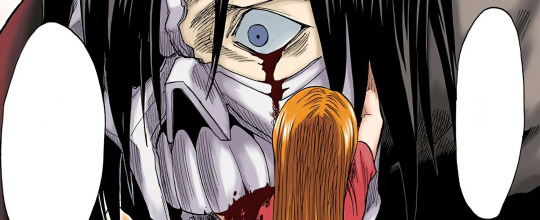

It could have been really interesting to see more of how a human can have an innately hollow like personality or impulse problems. It could have been cool to see how a familiarity with hollows spiritually could have resulted in a natural need to manifest a mask, but the mask is the Fullbring, but the Fullbring is more like a zanpakutou and its shikai than like a hollow mask. So instead of putting the best of yourself into a sword that can look you in the eye and offer you power in exchange for self respect and understanding you put the worst of yourself into an object and it gives you power in exchange for indulging in your compulsions and fixations.
Really the best version of this that we got was Riruka, where her "love" is literally possessive and manifests that first time as her abducting the boy she's basically stalking. And basically no one else got this kind of relationship with their Fullbring
Arguably Yukio replacing his negligent parents with his videogame world sort of touches on a version of it as well, but he's given such a passive role in that dynamic that it doesn't quite reflect on him so much as on his parents. If anything it could have been interesting to see his life as not as bad as he'd convinced himself it was, but that he actively chose fantasy over reality, rather than being pushed towards it by circumstance.
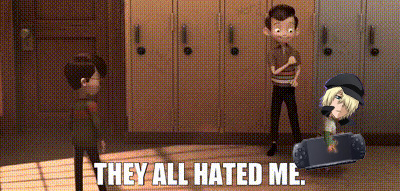
Alternatively it could have been cool to see how the Fullbring itself could've been hollow-like. In the way a hollow puts itself into its mask, a Fullbringer puts themselves into their objects. Is the spirit given to that special object benevolent, or even ambivalent, or is it a repository for all its user's negative thoughts and feelings? Does it grow stronger only as it serves to mask more and more of their self hatred and identity issues? Like the initial threat of the inner hollow swallowing and consuming an identity that Hirako threatens Ichigo with, could the Fullbring itself have threatened to consume its user? If you put enough of yourself into the object, and the object gains power and identity, is it possible that one day the object contains more of "you" than you do? Does it begin to want power on its own? Does it start to take more of that power, that emotional investment, that connection, that heart from its human user?
It would have been an interesting vehicle for Ichigo's arc if the Fullbring has explicitly been powered by unhealthy obsession and the substitution of a fetish totem in place of real interpersonal connections: if Ichigo's implicit flaw had been his attachment to his powers as an extension of his need to protect others. The way Riruka's flaw was in how she loved people onesidedly, literally objectifying them. The way Yukio's flaw was in how he retreated into a fake reality while neglecting the real one in a desperate need for control.
#bleach#fullbringer#bleach meta#hypothetical?#theory?#headcanon?#just ''what if?''#coulda/shoulda?#dunno what to call it
69 notes
·
View notes
Text
So the primary parallels between Marshall Lee and the Star’s stories, going back to back, seems to say two things:
The business world Ms Abadeer wants her son to go in is Hell; an evil place of cutthroat decisions where all that matters is what you want and getting it no matter the moral compromises you make. It’s the same as the Nightosphere, and a fairly direct translation from Ooo’s fantastical nature to the mundane world. It seems to be a universal constant; Abadeer wants the child who left them to take up the family business, even though they very much don’t want to and find the concept repellant.
So we see the Star, Marceline at her worst; a childish monster that murders without hesitation or concern, without any empathy for anyone but herself and the father figure she adores, who forces her minions to destroy themselves out of fear. There is nothing of the heroine that saved Ooo’s humans from vampire threats even as they ran away from her; this isn’t a person who wants to protect anyone.
She has very much entered the family business.
But as a contrast, we see that Lee is NOT like her. He is an incarnation of Marceline at their best; a humble person who left the business world on purpose and intends to never go back, but sacrifices his happiness for someone he just met, to make someone else happy and give them their dream.
The same applies to Gary/Gumball, and he acts as a contrast to the Bonnibel of Vampire World, though this arguably shows PB as more of a heroine, though a ruthless and rough one suited to the world she has to endure. She’s harsh, uncompromising and indifferent, evidently willing to run over seemingly harmless civilians (though with the implicit point that this particular scam has been used to trick her, and in a world like hers, she can’t afford to take risks) and barely blinks at one of her few friends and soldiers dying. And again, she is a daughter of the Vampire World; she is harsh, and cold and perhaps even callous, because she MUST be to survive such an awful place, just like how Farmworld Finn is closed off, tired and wary.
Gary shows a side of PB at their best, too. He doesn’t seem to really want to rule anything, but just to make the stuff he likes without having a demanding boss make him compromise his artistic ambitions; he’s horrified at the prospect of someone subjecting themselves to a miserable fate for his own benefit, and immediately drops his prospects so they don’t have to do that.
This shows PB and Marceline at their best; sacrificing something, taking responsibility and making the calls others shouldn’t have to. And it begs the question; much of what’s going on reflects on Simon in some way, even if its just the multiverse assuring him that yes, he DOES matter even as an ordinary guy with no power. Perhaps we do see it here, because they ARE inside his head, and it may be that his thoughts and mind influencing them.
The big thing about Simon that makes him important isn’t the power of the crown, but his impact on people, his restraint, and his willingness to let himself suffer because he believes its better that HE suffers than the world does. He might not be there in person, but perhaps an aspect of him is still influencing them, to make the best decisions they can.
#adventure time#fionna and cake#the star#marshall lee#prince gumball#gary prince#marceline#princess bubblegum#vampire world#analysis#meta#queued
61 notes
·
View notes
Text
I thought the way Caoxiang reflected and paralleled wenzhou in the middle of the story (during the four season manor arc mostly) was a really neat way to actually express the implicit conflict between Wenzhou at that time without being censored.
Like literally almost every insecurities that Ah Xiang express about her relationship with Cao Wining and why she keeps the ghost valley secret for so long could also be applied to Wen Kexing.
It also highlights how similar Ah Xiang and Wen Kexing are and I'm just here for the family feels.
112 notes
·
View notes
Text
The Daemonic Theory Of Engine Sentience: The Hermetic/Alchemical School
Now I introduce everyone to the schools of thought of engine animation. The introduction to the Daemonic Theory of Engine Animation is here
The first of these ideas is the Hermetic school:
“Hermetic” is derived from the idea of Hermeticism, a branch of mysticism said to be derived from the archetypal magician, Hermes Trimagistus and the works and writings attributed to him, which posits a very strongly ordered, top-down cosmos generally, where humans can achieve unity with the Godhead through the magical arts. One way of doing so is the mastery of the art known as “Alchemy”.
Popularly understood to be the pursuit of vulgar material wealth through the transformation of base materials into gold, the true quest (Great Work) is to create the Philosopher’s Stone, that Holy Grail said to be the key to eternal life, perfect health, enlightenment and happiness.
Implicit in this philosophy is the idea that it is to service mankind, not reserved greedily for oneself; but it is not for everyone to pursue.
The Hermetic theory of engine animation posits that an alchemical, metallurgical process is the channel that brings the Fire down into the locomotive’s shell and brings it life and sentience. The base iron, copper and brass is transformed through the medium of the Divine Fire into a living, thinking being. Through the manipulation of chemical and metallurgical elements, the achievement of the Philosopher’s Stone, or in this case, real sentient artificial life, is sought after.
The real challenge is not so much that it happened, but the study as to why it worked, in this space and time. Of the three strands, the Hermetic strain is probably the most self-reflective in its study as to why.
This theory bears some sympathy to Tanzig’s First Theory of Machine Sentience, in that life is created through the manipulation of material elements; in this case, the old art of alchemy meeting the new science of metallurgy.
Whats more, it that non-faceless vehicles all being created and rapidly appearing at the same time is the culmination of decades, centuries of work in such arts parallel with the development of the machine (which sort to liberate humanity from toil, alas such an aim has not been achieved…).
If mankind is creating actual artificial living creatures that aren’t simply automata on a regular basis, then a kind of spiritual evolution of mankind must have taken place for it to be even possible. Humans being able to achieve true sentient life reflects such a shift in spiritual consciousness.
This can even be reflected in the locomotive evolution themselves, in the further improvement of the form; and whats more, such sentient artificial life can learn and grow too in intellect and understanding.
Of the locomotives on Sodor, it is ex-Furness Railway NWR #2 Edward that demonstrates this evolution, from arrogant hot-blood (red) to venerable elder of the NWR(blue), and somehow he has achieved Eternal Youth in appearance and in his personality.
Some of the greatest theoreticians of natural philosophy and science like Sir Issac Newton were keen alchemists and this was the state of things until the rise of modern science.
Like the other theories, it can show flaws; namely that it seems to have an over-emphasis on a kind of overarching meta-theory, and forget that the creation of locomotives with sentience isn’t some byproduct of man’s search for divinity… but the entire point. The true question is why, and how.
***
Locomotives associated with this tendency may be called Terrestrials. The link with the Earth and its natural elements may have them manifest either a certain balanced serenity or a wild, impish, Fae-like tendency. A lot of them can be quite wild at heart and even a bit scary.
Genius Loci, Fae, and Elemental daemons can give rise in some locomotives; like the mysterious Proteus, who seems very Fae-like in his mannerisms.
#Ttte headcanons#ttte fandom#ttte fanfiction#ttte#thomas and friends#The Daemonic Theory Of Engine Sentience#Occultism#hermeticism#magick#fictional magick
5 notes
·
View notes
Note
I wanted to ask what you mean by this? "It takes some liberties with filler, and makes a few subtle changes with big fallout in terms of Guts leaving the Hawks imo (ie removing the inherent criticism and portraying it as necessary, which changes the central theme of the story lol)" What do you mean the 97 anime removes inherent criticism for Guts leaving the hawks and portrays it as necessary? I don't get what you're saying at all so I'd appreciate an explanation.
lol sorry, I breezed right over that because I've talked about it before and I have a tendency to forget that no one's read everything I've ever posted.
So basically
a) Guts leaving the Hawks was a Bad Decision in the manga. If you don't agree then this requires an essay behind it, so voila, here's that essay.
b) The anime portrayed it as a Good Decision for Guts, something he needed to do in pursuit of a noble, worthwhile goal.
The anime does this by changing a few key moments. One obvious one I always cite is the scene at Godo's, when Guts does his waterfall log exercise. In the manga this scene occurs in flashback after Wyald knocks him unconscious. Erika tells Guts he's going to die if he continues on the path he's going, and asks why tf he's doing this to himself. Guts basically says he has to get strong enough to defeat Zodd. End scene.
This contextualizes Guts' dream of sword swinging as an irrational need to defeat the guy who beat him. His goal is to fight Zodd again and win. Symbolically, due to the similar imagery they have in Guts' various nightmares and the essential themes of the story, Guts is driven to self-destructively fight monsters because of his csa trauma.
The anime, conversely, turns this moment into the first part of a training montage, dumps the conversation about fighting Zodd, and ends with Guts successfully slicing logs in half, signifying that he's now Strong Enough. It flattens all the nuance and implicit criticism of Guts out and turns it into a typical inspirational shounen moment.
There's also the Guts/Casca sex scene changing from two traumatized and miserable people hooking up ("licking wounds") into a much more cliched and straightforward romantic moment (using Guts' theme as a music cue, cutting out the choking and rape flashbacks and denial ("Don't think about those things right now,") swapping "I don't know if you'll get in the way of what I want to do or the opposite, but I wanna have you a hundred, no a thousand times" with "I don't know what the future will bring, all I know is I want to keep holding you," etc). All this adds up to Guts wanting to leave again with Casca being framed as the happily ever after that got foiled by the Eclipse, rather than part of the bad decision pile up that caused the Eclipse.
Cutting out the night after Guts leaves is another big one, removing Guts reflecting on whether he's making the right decision or whether he's throwing away a home and family based on a meaningless ideal that he can't even fulfill because it's a contradiction ("In the first place I got this idea in my head from hearing Griffith's words. If I hadn't... so can I say I've set out by my own will?") Spoiler alert, it's the second one. This theme is reinforced during the Lost Children Arc, so while it's not the anime's fault it cuts off abruptly, losing most of the Black Swordsman stuff also doesn't help.
The loss of the Wyald sequence in general cuts out so much implicative Guts character stuff - the irrationally driven to fight monsters due to trauma thing I mentioned earlier, but also Casca crying about it indicating that she would not be supportive of his goal if they did go off together, the self-destructiveness of Guts' monster hunting, and the parallels between Guts and Wyald (ie the other Hawks wondering if Guts is human, Wyald's forces being called the Black Dogs).
Even little tiny things like Guts telling Casca to stay back in the torture chamber, phrased as though he wants to spare her the sight of Griffith, rather than like he's irrationally guarding Griffith from anyone's approach, as is the manga vibe:

I don't think these changes are exactly intentional. I think they're mainly for pacing/content reasons - Guts stay at Godo's needed to be fleshed out because now it's half an episode, Guts' rape trauma is cut out so the Guts/Casca scene becomes less complicated, Skull Knight got cut so no long dark night of regretful contemplation, the Wyald sequence is a nightmare of pacing that had to be cut lol, etc. But they all add up to a Guts who is less flawed, less driven by trauma, and more driven by a noble, shounen-esque goal to be the best. It simplifies the story a lot imo, and downplays a lot of what makes Guts' narrative interesting to me.
Thanks for asking, hope that makes sense!
#ask#anonymous#a#b#theme: adaption#arguably I think you can still glean the negative side to guts leaving from the anime but it's a lot more subtle and contradictory#due to these kinds of changes
40 notes
·
View notes
Text
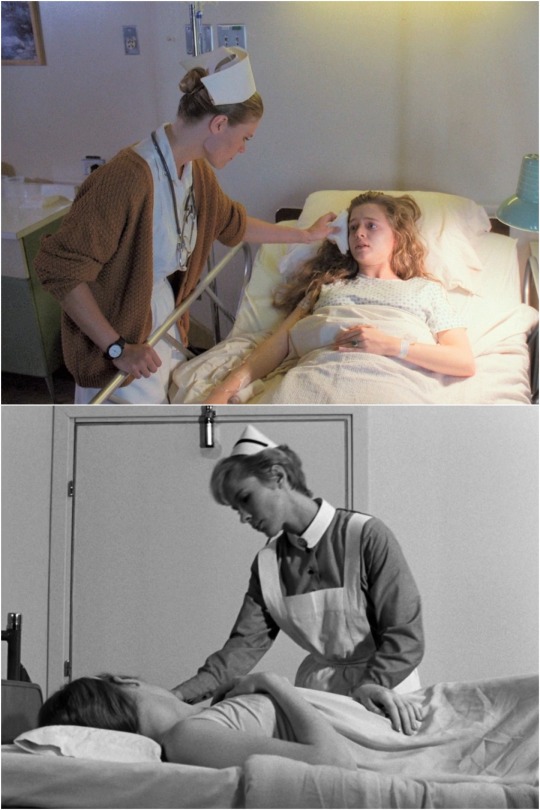
TWIN PEAKS: THE MISSING PIECES (2014, Lynch) x PERSONA (1966, Bergman) - near the end of both films
A nurse, in a distinctive nursing cap, cares for a largely mute patient in bed, & at some point is seen to take on some element of her identity...

Though the scene at the end of THE MISSING PIECES is short, it also parallels 3 other distinctive moments or elements from PERSONA: One, the nurse waves her right hand in front of Annie's face, just like the boy in the prologue to PERSONA waves his right hand in front of our face.
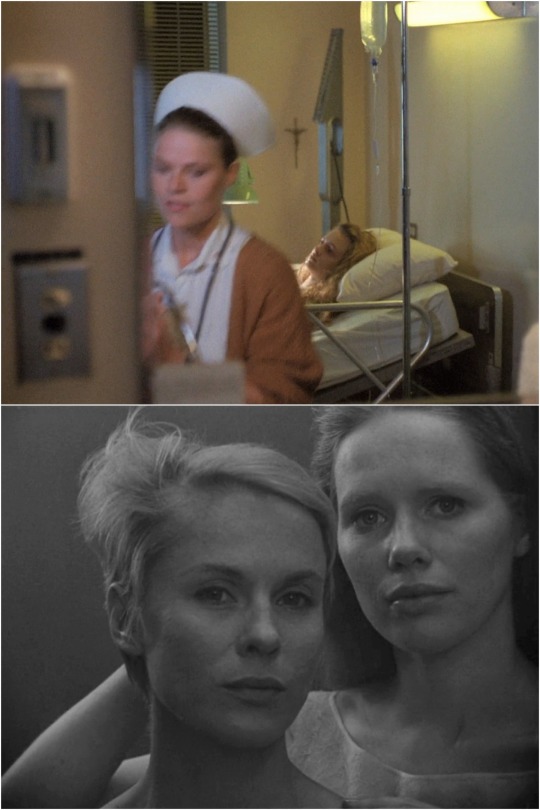
Two, we see Annie and the nurse reflected together in a mirror, just as in PERSONA we see Alma and Elisabet together in a mirror, in one of the most iconic sequences of that film. Notice also in the TP:TMP image above that there is a crucifix conspicuously hanging over Annie.

This crucifix brings out a third parallel, its Christian iconography echoing the Christ-like elements of PERSONA's symbolism, from that film's repeated imagery of a nail driven through a hand, to its moment of blood-drinking, to its mention of eternal life, & more...
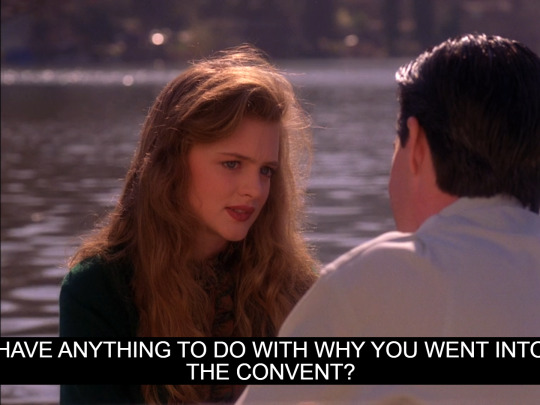

The distinctive nursing caps/uniforms worn in each film further draw out these Christian parallels by arguably evoking those of nuns' habits, a comparison underscored both in PERSONA by its nurse being referred to as "Sister Alma," & in TP by Annie's past life in a convent.
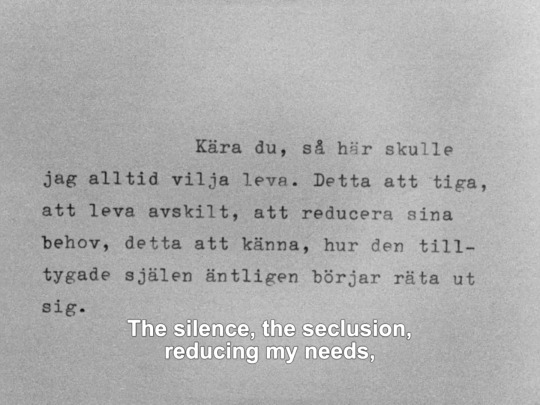
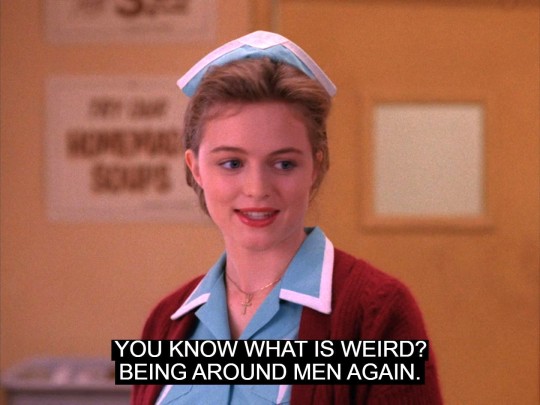

In addition to the world of religious symbols opened up by each work's implicit or explicit monastic references, the nun allusions also tie in themes of sisterhood, silence, and renunciation that are relevant to both works.

Indeed, Annie's situation at the end of MISSING PIECES seems to intentionally be suggestive of a type of return to this monastic state of silence, seclusion, and an absence of men, one steeped in Christian symbolism.

While neither Lynch nor Frost are practicing Christians (both seem more drawn to Dharmic religions), Annie's Christian faith is strongly emphasized in the series, carrying on a streak in TP's symbolism stretching back to MIKE's "face of God" soliloquy & forward to FWWM's angels.

While the Nurse-Annie scenes in TP:TMP may arguably be viewed as somehow less important to TP canon, given that they were originally deleted, it's important to note the very strong ways that scene parallels Laura's critical, Annie-featuring dream sequence in FWWM:

Consider the ways the Nurse-Annie scene mirrors the Laura-Annie scene. In each: 1). Annie recites the same statement. 2). The jade ring is then passed on to a new person 3). The ring-bearer then sees a reflection, looking back over their right shoulder into a room with a bed
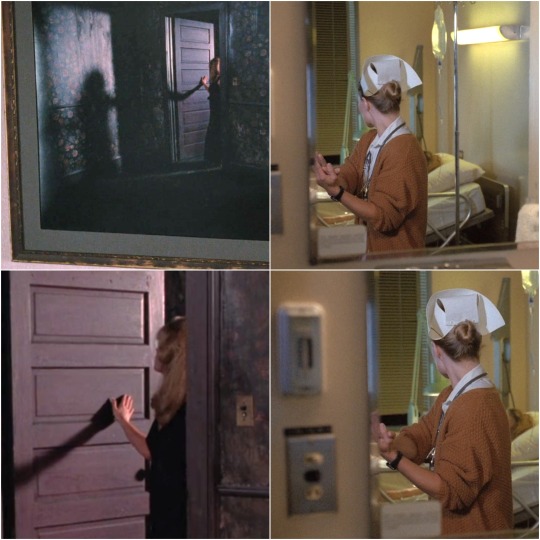
Indeed, as regards the "mirroring" moment, the construction is remarkably similar: we see a rectangular frame with a ring-bearing blonde looking over her right shoulder into a room with a bed. In the case of Laura, her outstretched right hand touches her shadow's hand; in the case of the nurse, her outstretched right hand (as seen in the mirror image) touches her left hand.

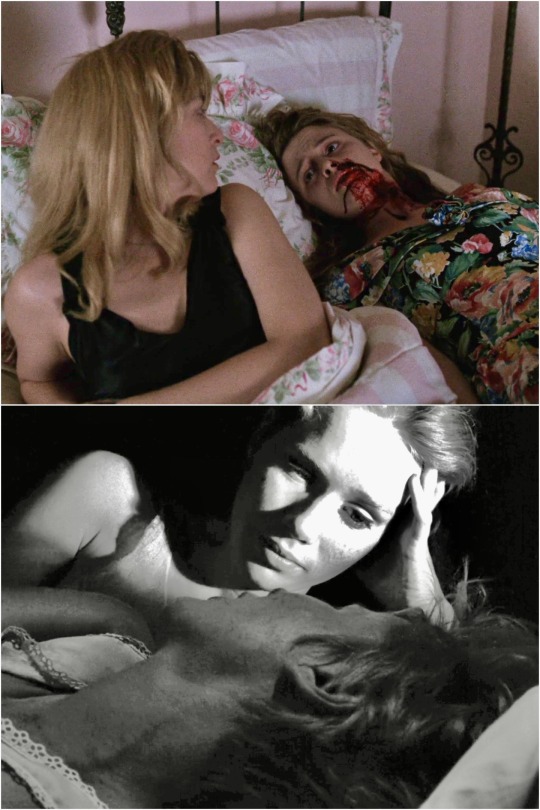
(Like the Annie-Nurse scene in TP:TMP, the Annie-Laura scene in FWWM arguably evokes moments of PERSONA as well, albeit here the parallels are more tenuous...)

(It's also perhaps worth noting a connection between Laura & a nurse made in the pilot episode, where a nurse stuffed-animal (a sockpuppet monkey?) can be seen in her bedroom.)
Other minor observations:

-In one of the few other notable elements of mise en scène in the TP:TMP scene, a painting of a lake in a forest can be seen behind the Nurse as she stares down at the ring (just before looking in the mirror), arguably evoking another iconic PERSONA image
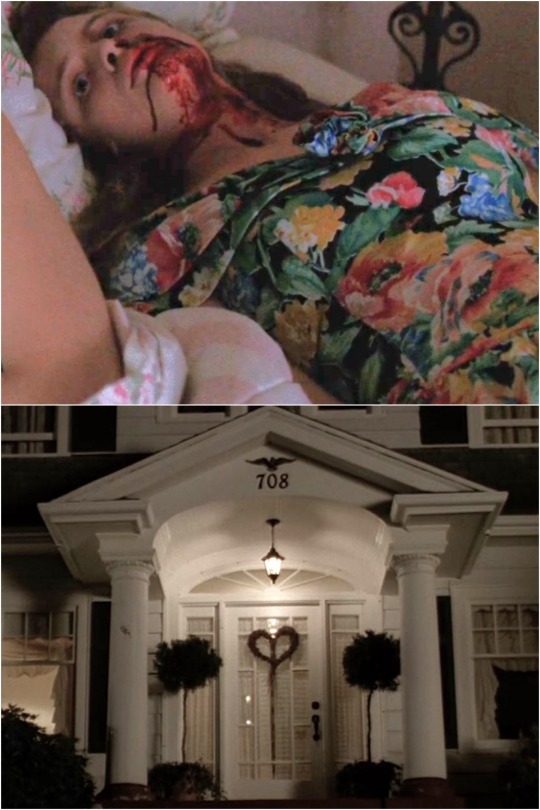
-The design on Laura's lamp post seen in several shots of Annie distinctly resembles a divided heart (much like the wreath on the Palmer House door, both suggesting Laura's "divided heart" necklace).
-Note also the 3D "flower" scrunch-flourish on Annie's dress evoking a blue rose.
Much more could be said about all of the topics herein, including especially the links between PERSONA & TP/Lynch generally, as well as the links between the Annie-Laura scene and the Annie-Nurse scene, each of which is deceptively deep.
To end, here's a 2018 quote from Lynch on what motivated his choice to return to TWIN PEAKS: “For a long time, no itch. But at the same time, there’s a thing in FWWM where Laura is in her bed and she's visited by Annie. Annie says, ‘I’m in the Black Lodge with the good Dale. Write that in your diary’. That little bit right there held a string of dreams"

27 notes
·
View notes
Text
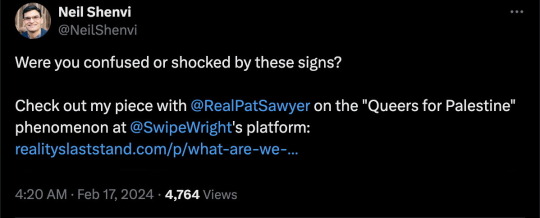

By: Neil Shenvi and Pat Sawyer
Published: Feb 13, 2024
On October 7th, 2023, most Americans watched in horror as Israel experienced the deadliest terrorist attacks in its history. In the days and weeks that followed, some of that horror mingled with confusion.
For example, on Oct. 8th—before an Israeli counteroffensive was launched—BLM Grassroots issued a “Statement in Solidarity with the Palestinian People,” writing that they “stand unwaveringly on the side of the oppressed” and “see clear parallels between Black and Palestinian people.” Two days later, BLM Chicago posted a graphic featuring a paraglider with a Palestinian flag and the text “I stand with Palestine” (terrorists had used paraglides to attack a Music festival on Oct. 7th, killing over three hundred civilians). Even more bizarre posts began turning up on social media. The Slow Factory, a progressive group with over 600k followers on Instagram, posted a graphic stating “Free Palestine is a Feminist issue. It’s a reproductive rights issue. It’s an Indigenous Rights issue. It’s a Climate Justice issue, it’s a Queer Rights issue, it’s an Abolitionist Issue.” The group “Queers for Palestine” began showing up with signs at various demonstrations. A banner hanging from a building at the University of British Columbia announced, “Trans liberation cannot happen without Palestinian Liberation.”
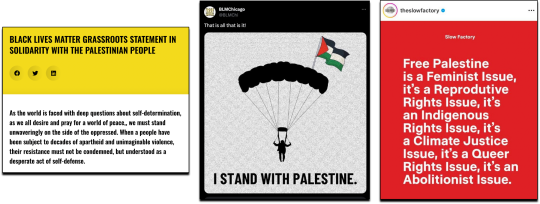
What explains these signs and sentiments, which seem to be springing up organically around the country and other parts of the world? How is the Hamas-Israel war connected to climate change? Why is it a feminist issue? Why are “queers” standing in solidarity with Palestine when Israel’s government is far more permissive than Palestine’s (for example, same-sex activity is criminalized in Gaza)? What has inspired an outpouring of egregious and unconscionable antisemitic rhetoric and behavior in various cities and on a number of college campuses?
The answer is, in a word, intersectionality. In this article, we’ll explain the intersectional framework that undergirds these phenomena and will then offer a brief reflection on how it can be resisted.
* * *
Intersectionality was a term coined by critical race theorist Kimberlé Crenshaw in 1989. She used it to describe the discrimination faced by Black women, whose social location (that is, their relationship to power within U.S. society) was predicated on both their race and their sex simultaneously. In other words, a Black woman’s experience cannot be reduced to merely the sum of her race and sex experiences. Instead, she occupies a unique (and uniquely marginalized) category that is shaped by both her Blackness and femininity.
Although Crenshaw’s first examples focused on race and gender, intersectionality was rapidly applied to other categories like sexuality, class, and disability, just as Crenshaw intended. Indeed, precursors to Crenshaw’s conception of intersectionality can be found in other Black feminist writings. For example, the Combahee River Collective Statement insisted in 1977 that it is “difficult to separate race from class from sex oppression because... they are most often experienced simultaneously” and feminist Beverly Lindsay argued in 1979 that sexism, racism, and classism exposed poor Black women to “triple jeopardy” (see Collins and Bilge, Intersectionality, p. 76).
So in what ways does intersectionality shape progressive views on the Israel-Hamas War?
First, through its embrace of the social binary; second, through its implicit adoption of the category of “whiteness,” and finally through its commitment to solidarity in liberation.
The Social Binary
While the concept of intersectionality can be understood narrowly to refer to the trivial claim that our identities are complex and multifaceted, Crenshaw intended a far more robust understanding rooted in a prominent feature of critical social theory, what we call the “social binary.” The social binary refers to the belief that society is divided into oppressed groups and oppressor groups along lines of race, class, gender, sexuality, physical ability, religion, and a host of other identity markers. Crenshaw did not merely believe that Black women (and White men, and Hispanic lesbians) all had different social locations, but that they had differently-valued social locations.
In a 1989 paper, Crenshaw asked the reader to “[imagine] a basement which contains all people who are disadvantaged on the basis of race, sex, class, sexual preference, age and/or physical ability” and who were then literally stacked “feet standing on shoulders with the multiply-disadvantaged at the bottom and the fully privilege at the very top.” This understanding of intersectionality necessarily assumes a hierarchy of oppression and privilege such that people can be ranked in order from most to least oppressed.
Although Crenshaw didn’t discuss “colonial status” in the body of her paper, she did state in a footnote that Third World feminism is inevitably subordinated to the fight against “international domination” and “imperialism.” It is at precisely this point that intersectionality affects progressive understanding of Israel-Palestinian relationships.
Later critical social theorists, and especially postcolonial scholars, believe that colonialism—like white supremacy, the patriarchy, and heterosexism—divides society into oppressed and oppressor groups. Because the Israeli government is positioned as a “colonizing foreign power,” it is therefore necessarily oppressive. Conversely, Palestinians are then necessarily positioned as a colonized, oppressed group. Never mind the spurious assessment of both. Note here that critical theorists make these judgments not on the basis of the actual history of the region (which is complex) or a careful analysis of particular Israeli policies (which are certainly open to debate). Rather, the mere identification of Israel as a “colonial power” is all that is needed to set up a social binary between the Israelis and Palestinians.
The social binary then explains why some progressives make such a quick, simplistic analysis: intersectionality deceptively primes them to see the world in these black-and-white terms.
Whiteness
A second factor that contributes to a reflexive pro-Palestinian perspective by some in the U.S. is the ascendance of critical race theory and an attendant understanding of “whiteness.”
CRT, which was birthed concurrently with intersectionality in the late 1980s, conceptualizes whiteness not as a skin color or even as an ethnicity, but as a social construct that provides tangible and intangible benefits to those raced as “White.” (Notwithstanding that white skin and whiteness are often conflated when it serves the interests of progressives). Whiteness as a social construct signals that “whiteness” is fluid and malleable and need not only include people traditionally understood as White. For example, in his important 2003 book Racism Without Racists, sociologist Eduardo Bonilla-Silva hypothesized that America could develop a “triracial order” consisting of “Whites,” “Honorary Whites,” and “Collective Black.” On Bonilla-Silva’s reading, Whites would include not just Anglo-Saxons, but also “Assimilated white Latinos,” “Some multiracials,” “Assimilated (urban) Native Americans,” and “A few Asian-origin people.” On the other hand, the “Collective Black” category would include “Vietnamese Americans,” “Dark-skinned Latinos,” and “Reservation-bound Native Americans” (see Bonilla-Silva, Racism Without Racists, 228).
Critical race theorists have long wrestled with the place of Jewish people within their racial hierarchy. On the one hand, Americans did not traditionally consider Jews “White” and the U.S. has explicitly discriminated against Jews in the recent past (Jewish admission quotas at Ivy League Schools being one glaring example). On the other hand, many critical race theorists today believe that most Jews have assimilated to whiteness and benefit from “White privilege” and therefore should be classified as White. In her chapter “Whiteness, Intersectionality, and the Contradictions of White Jewish Identity,” Jewish psychologist Jodie Kliman writes that,
As European Jews have slowly ‘become’ white over the last three generations (Brodkin, 1998), we have internalized White supremacy in general and anti-Black prejudice in particular...Immigrant Jews and their descendants assimilated into US society, becoming white, or sort of white...
Unfortunately, to the extent that American Jews are viewed as “White adjacent” while Palestinians are viewed as “Brown,” the former are members of an oppressor group and the latter of an oppressed group. This categorization adds another layer to knee-jerk progressive support for Palestinians.
Liberation
Finally, the glue that binds together pro-Palestinian, pro-LGBTQ, and feminist activists is a shared commitment to mutual liberation. Again, this commitment is not new; it is found in the earliest texts of critical race theory, including those authored by Crenshaw herself. For instance, in the 1993 anthology Words that Wound, she and other co-founders of CRT wrote that a “defining element” of CRT is the commitment to ending all forms of oppression: They write:
Critical race theory works toward the end of eliminating racial oppression as part of the broader goal of ending all forms of oppression. Racial oppression is experienced by many in tandem with oppressions on grounds of gender, class, or sexual orientation. Critical race theory measures progress by a yardstick that looks to fundamental social transformation. The interests of all people of color necessarily require not just adjustments within the established hierarchies, but a challenge to hierarchy itself (Matusda et al., Words that Wound, 6-7).
This last point is crucial to understanding the automatic solidarity between, say, LGBTQ activists and decolonial activists. One could, in principle, accept that both LGBTQ people and Palestinians are oppressed groups and still conclude that their goals are mutually exclusive. For example, most Palestinians are Muslim and traditional Islam rejects the sexual autonomy demanded by LGBTQ activists. Yet an intersectional framework insists that homophobia, transphobia, Islamophobia, and colonialism are all “interlocking systems of oppression” that can and must be overturned simultaneously—never mind the details.
Lest anyone worry that we’re misinterpreting or overstating the degree to which popular progressive sentiments surrounding this issue are shaped by a fundamental commitment to intersectionality, consider the article “Palestine is a Feminist Issue” from the U.S. Campaign for Palestinian Rights. It begins with a quotation from Mariam Barghouti “Fundamentally speaking, feminism cannot support racism, supremacy and oppressive domination in any form” and immediately explains intersectionality in its opening paragraph:
Intersectional feminism is a framework that holds that women’s overlapping, or intersecting, identities impact the way they experience oppression and discrimination. Intersectionality rejects the idea that a woman’s experience can be reduced to only her gender, and insists that we look at the multiple factors shaping her life: race, class, ethnicity, disability, citizenship status, sexual orientation, and others, as well as how systems of oppression are connected... When we look at the world through an intersectional feminist lens, it becomes clear that Palestine is a feminist issue.
Conclusions
While the reaction of some progressives to the Hamas-Israel war took many people, especially Jewish people, by surprise, it was largely predictable given the powerful influence that intersectionality exerts on our culture. Intersectionality can lead to a grotesque moral calculus that justifies Hamas’ rape of Israeli girls as an understandable response of the oppressed lashing out at their oppressor. It has caused university presidents at our elite institutions to shamefully equivocate and prevaricate when given opportunity to unapologetically condemn antisemitism. Unfortunately, these examples are natural outworkings of the intersectional worldview.
For those who are alarmed by what seems to be growing acceptance of anti-Semitism within some segments of the left, we offer the following action items.
First, we should resist critical theory’s simplistic moral categories of Oppressor vs. Oppressed. To the extent that we see every conflict as a battle between innocent victims and cruel victimizers, we will gloss over the moral complexities of reality.
Second, we need to see people primarily as individuals rather than as avatars of their demographic groups. It’s much easier to dehumanize abstract categories than the nervous old woman across the street or the energetic cashier at the grocery store. Personal connection is an antidote to demonization.
Finally, we need to be realistic about the perniciousness of “woke” ideology, which has been infiltrating our institutions, universities, businesses, and places of worship for decades. Many social movements have waved the banner of progress and justice while slaughtering tens of millions. If we don’t learn from history, we very well may repeat it.
#Neil Shenvi#antisemitism#queers for palestine#chickens for KFC#hamas supporters#critical theory#oppressor vs oppressed#oppressor#oppressed#intersectionality#intersectional feminism#whiteness#social binary#woke#wokeness#cult of woke#wokeism#wokeness as religion#religion is a mental illness
11 notes
·
View notes